Equitable and sustainable health
Dedicated to the possibility that everyone, everywhere can reach their full health potential our projects are pushing the limits of medical innovation, shaping policy and demanding access for all.
Research impact case studies
-
Life of Breath: Improving understanding of breathlessness
Research by the Department of Philosophy has revolutionised the way breathlessness is understood by medical professionals and the public.
-
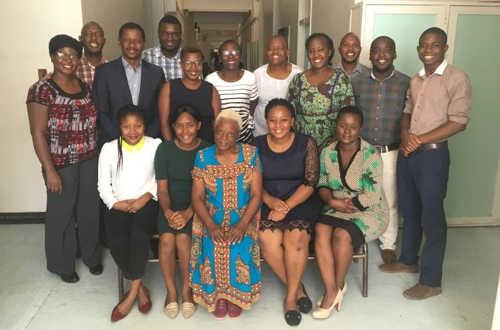 HIV, menopause and musculoskeletal health
Understanding the impact of HIV infection and menopause on the musculoskeletal health of African women.
HIV, menopause and musculoskeletal health
Understanding the impact of HIV infection and menopause on the musculoskeletal health of African women. -
 COVID-19 and the 'forced culture change' in higher education
Our research captures the lives and views of those working in higher education during the recent mass online migration.
COVID-19 and the 'forced culture change' in higher education
Our research captures the lives and views of those working in higher education during the recent mass online migration. -
 Supporting Early Years transition to school
Examining the effects of the Covid-19 pandemic on early years transition to school, with a focus on children with SEND and children from disadvantaged backgrounds.
Supporting Early Years transition to school
Examining the effects of the Covid-19 pandemic on early years transition to school, with a focus on children with SEND and children from disadvantaged backgrounds. -
 Reimagining the Diary
Helping to improve teacher wellbeing in the UK
Reimagining the Diary
Helping to improve teacher wellbeing in the UK -
 Research helps define and improve the management of ‘medical manslaughter’ cases
Dr Oliver Quick is a recognised authority in Criminal Law and Medical Law, with a special interest in patient safety. His recent research has focused on how prosecutors and experts negotiate criminal law and process in these controversial cases.
Research helps define and improve the management of ‘medical manslaughter’ cases
Dr Oliver Quick is a recognised authority in Criminal Law and Medical Law, with a special interest in patient safety. His recent research has focused on how prosecutors and experts negotiate criminal law and process in these controversial cases. -
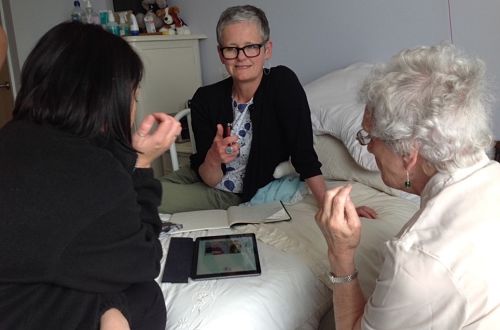 Improving the quality of life of older people
Using objects and storytelling in care homes helps residents build social connections and improves their quality of life.
Improving the quality of life of older people
Using objects and storytelling in care homes helps residents build social connections and improves their quality of life. -
 Bridging Gaps in primary healthcare for women with complex needs
A co-produced intervention that not only successfully increased the number of women with complex needs accessing mainstream healthcare, but also empowered the women concerned to act as champions and advocates in their community.
Bridging Gaps in primary healthcare for women with complex needs
A co-produced intervention that not only successfully increased the number of women with complex needs accessing mainstream healthcare, but also empowered the women concerned to act as champions and advocates in their community. -
 Delivering equality of support for parents with learning difficulties
Without early and on-going support these families often face extremely complex difficulties resulting in concerns about neglect by omission – not knowing how to look after their children, rather than deliberate abuse.
Delivering equality of support for parents with learning difficulties
Without early and on-going support these families often face extremely complex difficulties resulting in concerns about neglect by omission – not knowing how to look after their children, rather than deliberate abuse. -
 Taking action on mortality reviews of people with learning disabilities
Bristol is now a leading institution for the study of mortality of people with learning disabilities, not only nationally but also internationally.
Taking action on mortality reviews of people with learning disabilities
Bristol is now a leading institution for the study of mortality of people with learning disabilities, not only nationally but also internationally. -
 Helping to enable children’s rights to citizenship
Numerous children are in precarious life situations despite being born or having lived in the UK for years and being eligible for the secure status of citizenship.
Helping to enable children’s rights to citizenship
Numerous children are in precarious life situations despite being born or having lived in the UK for years and being eligible for the secure status of citizenship. -
 Creating inclusive care home environments for older LGBT+ people
Sexual orientation as a social and cultural dimension to older people's lives is often obscured within health and social care policy and practice settings. This situation is even more problematic for older lesbian, gay, bisexual and transgender (LGBT+) individuals.
Creating inclusive care home environments for older LGBT+ people
Sexual orientation as a social and cultural dimension to older people's lives is often obscured within health and social care policy and practice settings. This situation is even more problematic for older lesbian, gay, bisexual and transgender (LGBT+) individuals. -
 Putting mental health research into practice
Charities might not be the first thing people think about when they hear the word ‘industry’. However, third sector and charitable companies like Second Step contribute tens of billions of pounds to the UK economy each year - Dr Myles-Jay Linton
Putting mental health research into practice
Charities might not be the first thing people think about when they hear the word ‘industry’. However, third sector and charitable companies like Second Step contribute tens of billions of pounds to the UK economy each year - Dr Myles-Jay Linton -
 Mental Health and Personal Finance
Research suggests that one in four people with mental health problems are in debt, while one in two people in debt have a mental health problem.
Mental Health and Personal Finance
Research suggests that one in four people with mental health problems are in debt, while one in two people in debt have a mental health problem. -
 Inclusive walking for Bristol’s transport planning and public health
Walking is a convenient and free form of exercise, and a carbon neutral mode of transport. In Bristol there are both reasons and opportunities for walking to both improve people’s health and to address local transport issues.
Inclusive walking for Bristol’s transport planning and public health
Walking is a convenient and free form of exercise, and a carbon neutral mode of transport. In Bristol there are both reasons and opportunities for walking to both improve people’s health and to address local transport issues. -
.gif) Testing a new approach to dietary changes for type 2 diabetes
There are only around 9,000 registered dietitians in the UK and not all have expertise in the prevention and management of diabetes. Dr Anne Haase and Dr Clare England developed a specific approach to help set relevant goals and to support diet behaviour change for type 2 diabetes patients.
Testing a new approach to dietary changes for type 2 diabetes
There are only around 9,000 registered dietitians in the UK and not all have expertise in the prevention and management of diabetes. Dr Anne Haase and Dr Clare England developed a specific approach to help set relevant goals and to support diet behaviour change for type 2 diabetes patients. -
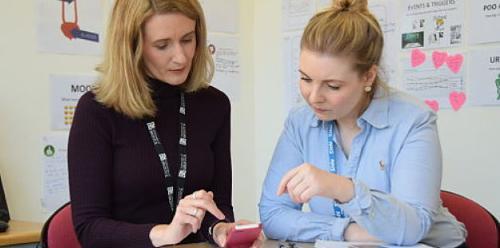 Research leads to practical support for young people with continence problems
Bladder and bowel problems are very common and can be affected by psychological issues and stressful life events in a child’s life. There is also strong evidence that bladder and bowel problems affect the mental health of children, young people and their parents.
Research leads to practical support for young people with continence problems
Bladder and bowel problems are very common and can be affected by psychological issues and stressful life events in a child’s life. There is also strong evidence that bladder and bowel problems affect the mental health of children, young people and their parents. -
 Generation Snowstorm – a Social Change Summer School as a mental health intervention
Off The Record (OTR) Bristol is an innovative young people's mental health charity with a focus on engaging young people in service design and delivery. Over 2017-18 Dr Nathan Eisenstadt collaborated with OTR on a Knowledge Exchange project funded by Bristol's ESRC Impact Acceleration Account.
Generation Snowstorm – a Social Change Summer School as a mental health intervention
Off The Record (OTR) Bristol is an innovative young people's mental health charity with a focus on engaging young people in service design and delivery. Over 2017-18 Dr Nathan Eisenstadt collaborated with OTR on a Knowledge Exchange project funded by Bristol's ESRC Impact Acceleration Account. -
 Improving responses to violence against refugee and asylum-seeking women
Sexual violence against refugee and asylum-seeking (RAS) women is occurring across Europe and the Mediterranean countries. International agencies and institutions including the UN, UNHCR, Council of Europe, and European Parliament have highlighted the urgent need for action to be taken.
Improving responses to violence against refugee and asylum-seeking women
Sexual violence against refugee and asylum-seeking (RAS) women is occurring across Europe and the Mediterranean countries. International agencies and institutions including the UN, UNHCR, Council of Europe, and European Parliament have highlighted the urgent need for action to be taken. -
 Research leads to licensed training on assessing parents' capacity to change in child welfare cases
C-Change was designed by researchers in Bristol's Children and Families Research Centre and successfully licensed to partner Interface Enterprises to deliver national training.
Research leads to licensed training on assessing parents' capacity to change in child welfare cases
C-Change was designed by researchers in Bristol's Children and Families Research Centre and successfully licensed to partner Interface Enterprises to deliver national training. -
 Promoting culturally sensitive services to support Somali families affected by autism
Dr Fiona Fox, Therapeutic Media, and Autism Independence together won ESRC Impact Acceleration Account (IAA) funding to produce a film that supports both the needs of the families and the practitioners trying to help them.
Promoting culturally sensitive services to support Somali families affected by autism
Dr Fiona Fox, Therapeutic Media, and Autism Independence together won ESRC Impact Acceleration Account (IAA) funding to produce a film that supports both the needs of the families and the practitioners trying to help them. -
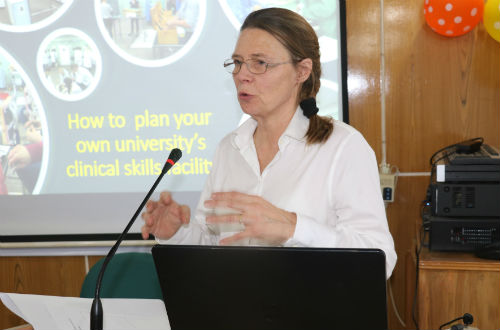 Improving veterinary prospects with a global approach to professional development
Hundreds of trainees and practicing vets are benefiting from initiatives undertaken by Bristol Vet School’s clinical skills team, including workshops delivered around the world, innovative approaches to developing animal models and open access knowledge systems.
Improving veterinary prospects with a global approach to professional development
Hundreds of trainees and practicing vets are benefiting from initiatives undertaken by Bristol Vet School’s clinical skills team, including workshops delivered around the world, innovative approaches to developing animal models and open access knowledge systems. -
 Reducing the Poverty Premium
In 2016 the Personal Finance Research Centre measured for the first time how many current low-income households are actually affected by poverty premium, and by how much.
Reducing the Poverty Premium
In 2016 the Personal Finance Research Centre measured for the first time how many current low-income households are actually affected by poverty premium, and by how much. -
 Driving responsible use of antimicrobials
Researchers, practitioners and industry bodies across the food chain successfully combined forces for policy and practitioner changes in antimicrobial use on farms and in veterinary practices.
Driving responsible use of antimicrobials
Researchers, practitioners and industry bodies across the food chain successfully combined forces for policy and practitioner changes in antimicrobial use on farms and in veterinary practices. -
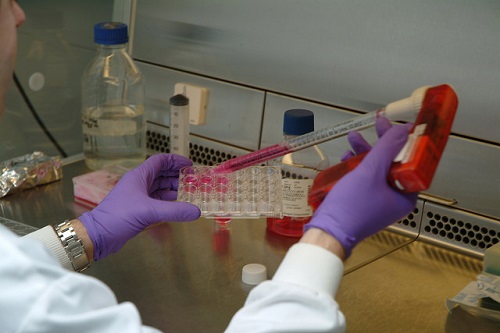 The future of synthetic vaccines: combining cutting edge science and global collaboration to protect lives
The University of Bristol will contribute to a new research hub to increase global immunisation coverage and improve the response to viral outbreaks through the rapid and cost-effective deployment of vaccines.
The future of synthetic vaccines: combining cutting edge science and global collaboration to protect lives
The University of Bristol will contribute to a new research hub to increase global immunisation coverage and improve the response to viral outbreaks through the rapid and cost-effective deployment of vaccines. -
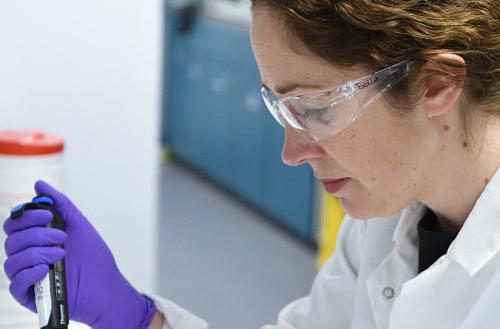 Controlled release antimicrobial to offer alternative to antibiotics
Ten years of Bristol’s pioneering biomaterials research has led to the launch of a novel technology to prevent and treat bacterial infection. The award-winning technology has exciting potential across human and veterinary medicine and could help combat the rising threat of antimicrobial drug resistance.
Controlled release antimicrobial to offer alternative to antibiotics
Ten years of Bristol’s pioneering biomaterials research has led to the launch of a novel technology to prevent and treat bacterial infection. The award-winning technology has exciting potential across human and veterinary medicine and could help combat the rising threat of antimicrobial drug resistance. -
 Worldwide access for children to sight-saving medication
The eye disease uveitis affects thousands of children every year - but a landmark trial has enabled worldwide access to new, sight-saving medication.
Worldwide access for children to sight-saving medication
The eye disease uveitis affects thousands of children every year - but a landmark trial has enabled worldwide access to new, sight-saving medication. -
.jpg) Preventing tick-borne disease through awareness
The largest study of ticks on dogs ever undertaken in the UK provided the science behind a successful and high profile campaign, endorsed by TV presenter and naturalist Chris Packham, to raise awareness of tick-borne diseases and how to protect against them.
Preventing tick-borne disease through awareness
The largest study of ticks on dogs ever undertaken in the UK provided the science behind a successful and high profile campaign, endorsed by TV presenter and naturalist Chris Packham, to raise awareness of tick-borne diseases and how to protect against them. -
 Seabed life promises new wave of antibiotics
The search is on for new antibiotics, with antimicrobial resistance now one of the world’s most pressing public health issues.
Seabed life promises new wave of antibiotics
The search is on for new antibiotics, with antimicrobial resistance now one of the world’s most pressing public health issues. -
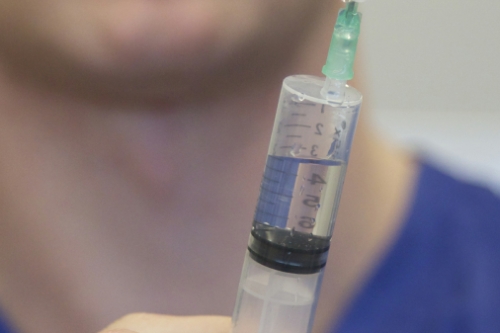 Meningitis vaccine could save thousands of young lives
Research directly influencing the Department of Health’s decision to introduce a vaccine against meningitis B into the routine immunisation schedule for all babies in the UK could avert over 4,400 cases of meningococcal disease in England over the next 10 years.
Meningitis vaccine could save thousands of young lives
Research directly influencing the Department of Health’s decision to introduce a vaccine against meningitis B into the routine immunisation schedule for all babies in the UK could avert over 4,400 cases of meningococcal disease in England over the next 10 years. -
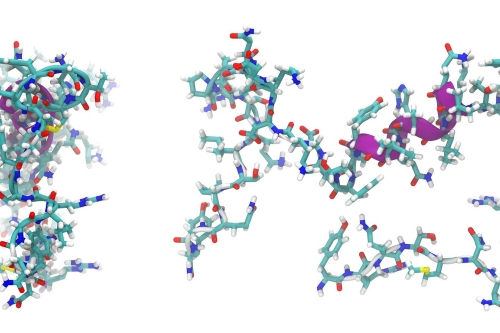 Revolutionising synthetic peptide production
Biochemists at the University of Bristol have developed a revolutionary method for peptide design and production that will contribute to the availability of more effective pharmaceuticals.
Revolutionising synthetic peptide production
Biochemists at the University of Bristol have developed a revolutionary method for peptide design and production that will contribute to the availability of more effective pharmaceuticals. -
 Protecting consumers from weight-loss claims
Food giant Unilever abandoned plans to incorporate Fabuless into its slimming products following a study by experimental psychologists at the University of Bristol.
Protecting consumers from weight-loss claims
Food giant Unilever abandoned plans to incorporate Fabuless into its slimming products following a study by experimental psychologists at the University of Bristol. -
 Investigating the relationship between braces and gum disease
Using molecular technologies to monitor plaque, researchers found no predisposition for children wearing braces to gum disease - as long as they follow brushing instructions carefully.
Investigating the relationship between braces and gum disease
Using molecular technologies to monitor plaque, researchers found no predisposition for children wearing braces to gum disease - as long as they follow brushing instructions carefully. -
 Influencing cancer drug development programmes
Collaboration between researchers and the pharmaceutical industry has led to major investment in cancer drug discovery programmes that target inhibitors in transporter proteins.
Influencing cancer drug development programmes
Collaboration between researchers and the pharmaceutical industry has led to major investment in cancer drug discovery programmes that target inhibitors in transporter proteins. -
 Improving livestock health through targeted parasite management
Research into roundworms that cause disease in livestock has improved the targeted control of these parasites, resulting in healthier animals and economic benefits for farmers.
Improving livestock health through targeted parasite management
Research into roundworms that cause disease in livestock has improved the targeted control of these parasites, resulting in healthier animals and economic benefits for farmers. -
 Street-play model copied nationwide
Bristol has more street-play schemes than any other city in the UK, due in part to University research.
Street-play model copied nationwide
Bristol has more street-play schemes than any other city in the UK, due in part to University research. -
Altering cellular function of immune system could help target allergies
Peanut allergy has long-term consequences and potentially life threatening effects, but there is no clinically available cure. A cellular and molecular could provide new clues.
-
 Learning what longer life means for kids with HIV in Africa
Antiretroviral therapy greatly improves survival rates for HIV-positive people - but with this success come pressing new challenges.
Learning what longer life means for kids with HIV in Africa
Antiretroviral therapy greatly improves survival rates for HIV-positive people - but with this success come pressing new challenges. -
 Focusing healthcare competition on quality not price
Bristol research leads to hospitals competing on quality - not price - for elective care, improving patient experience without increasing resource use.
Focusing healthcare competition on quality not price
Bristol research leads to hospitals competing on quality - not price - for elective care, improving patient experience without increasing resource use. -
 Adaptive immunity
Discovery of a bacterial protein's unusual properties have given rise to a novel drug for the treatment of inflammatory diseases which affect hundreds of millions of people globally.
Adaptive immunity
Discovery of a bacterial protein's unusual properties have given rise to a novel drug for the treatment of inflammatory diseases which affect hundreds of millions of people globally. -
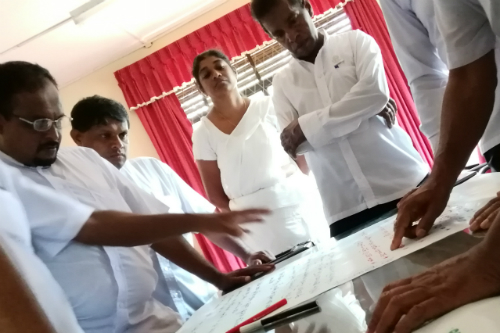 Reducing suicide risk in Sri Lanka
More people survive suicide in Sri Lanka than ever before – but there’s no let-up in the number of people attempting it.
Reducing suicide risk in Sri Lanka
More people survive suicide in Sri Lanka than ever before – but there’s no let-up in the number of people attempting it. -
 Improving prospects for people with kidney disease
It’s rare in the UK, so you may not have heard of nephrotic syndrome, but in low-to-middle income countries it’s fatally under-recognised and under-resourced.
Improving prospects for people with kidney disease
It’s rare in the UK, so you may not have heard of nephrotic syndrome, but in low-to-middle income countries it’s fatally under-recognised and under-resourced. -
 Raising welfare standards improves meat quality in poultry
Research into water bath and gas stunning techniques raises welfare standards and improves meat quality in commercial poultry slaughterhouses.
Raising welfare standards improves meat quality in poultry
Research into water bath and gas stunning techniques raises welfare standards and improves meat quality in commercial poultry slaughterhouses. -
 Phasing out all-metal hip replacements
Research revealing the relatively high failure rates of metal-on-metal implants in hip replacement surgery has led to a dramatic decline in their use.
Phasing out all-metal hip replacements
Research revealing the relatively high failure rates of metal-on-metal implants in hip replacement surgery has led to a dramatic decline in their use. -
 Transforming cardiac surgery with pioneering techniques
‘Beating-heart’ surgery is used in over 20% of cardiac operations worldwide, improving survival and recovery rates for patients and reducing surgery costs by up to 25%.
Transforming cardiac surgery with pioneering techniques
‘Beating-heart’ surgery is used in over 20% of cardiac operations worldwide, improving survival and recovery rates for patients and reducing surgery costs by up to 25%. -
 Genetic mapping improves understanding of osteoarthritis
Using multi-disciplinary techniques to map the development of osteoarthritis in zebrafish genes allows a greater understanding of joint deterioration in humans.
Genetic mapping improves understanding of osteoarthritis
Using multi-disciplinary techniques to map the development of osteoarthritis in zebrafish genes allows a greater understanding of joint deterioration in humans. -
 Sugar sensing technology
Synthetic carbohydrate- sensing molecules are at the core of an innovative new carbohydrate sensing technology being developed and commercialised by the start-up chemistry company, Ziylo.
Sugar sensing technology
Synthetic carbohydrate- sensing molecules are at the core of an innovative new carbohydrate sensing technology being developed and commercialised by the start-up chemistry company, Ziylo. -
 Reducing the likelihood of developing a leading cause of blindness
Researchers have developed a unique device that can be used to test people for one of the risk factors for age-related macular degeneration – the leading cause of blindness in the UK.
Reducing the likelihood of developing a leading cause of blindness
Researchers have developed a unique device that can be used to test people for one of the risk factors for age-related macular degeneration – the leading cause of blindness in the UK. -
IRIS training helps victims of domestic abuse
Training and support programme IRIS enables GPs to identify patients affected by domestic violence and abuse and refer them to specialist services, benefiting the patient and saving NHS resources.
-
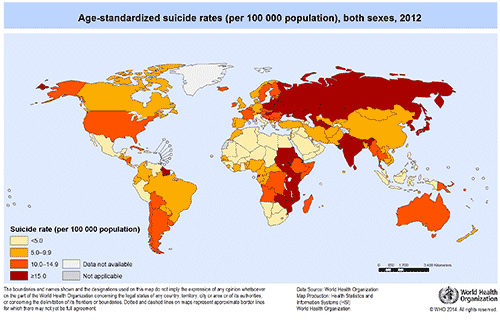 Shaping suicide prevention initiatives
Research has helped shape local, national and global suicide prevention initiatives, leading to subsequent reductions in suicide rates.
Shaping suicide prevention initiatives
Research has helped shape local, national and global suicide prevention initiatives, leading to subsequent reductions in suicide rates. -
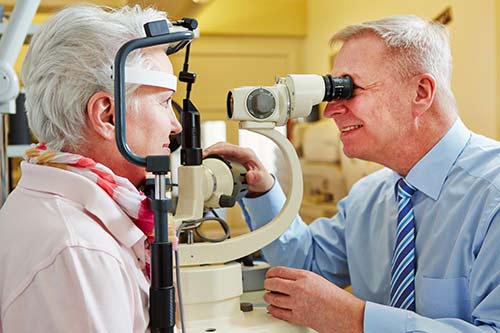 Changing policy on second eye cataract surgery
Research into good practice have reduced waiting times for second eye cataract surgery, meaning UK patients get the benefits of surgery sooner.
Changing policy on second eye cataract surgery
Research into good practice have reduced waiting times for second eye cataract surgery, meaning UK patients get the benefits of surgery sooner. -
 Transforming public understanding of the brain
Professor Hood’s BBC series ‘Meet your brain’ proved such a success that the British Council invited him to repeat his lectures in Japan, China, South Korea and Singapore.
Transforming public understanding of the brain
Professor Hood’s BBC series ‘Meet your brain’ proved such a success that the British Council invited him to repeat his lectures in Japan, China, South Korea and Singapore. -
 Increasing active travel to school
Research proving that walking or cycling to school results in health benefits has informed national and international policy.
Increasing active travel to school
Research proving that walking or cycling to school results in health benefits has informed national and international policy. -
 Mixed treatment comparisons inform clinical guidelines
A new technique for comparing healthcare treatment options is helping policy makers in the UK, Canada, Germany, and South Korea.
Mixed treatment comparisons inform clinical guidelines
A new technique for comparing healthcare treatment options is helping policy makers in the UK, Canada, Germany, and South Korea. -
 Improving life expectancy for HIV positive people
Research showed that antiretroviral treatment dramatically increases life expectancy and should be started as early as possible, leading to a major change of approach by policy makers, clinicians and insurers across the world.
Improving life expectancy for HIV positive people
Research showed that antiretroviral treatment dramatically increases life expectancy and should be started as early as possible, leading to a major change of approach by policy makers, clinicians and insurers across the world. -
 Harnessing fungi's medicinal and agricultural potential
The Basidio Molecular Toolkit enables the global agricultural and pharmaceutical industry to make dramatic breakthroughs in crop production and antibiotic research.
Harnessing fungi's medicinal and agricultural potential
The Basidio Molecular Toolkit enables the global agricultural and pharmaceutical industry to make dramatic breakthroughs in crop production and antibiotic research. -
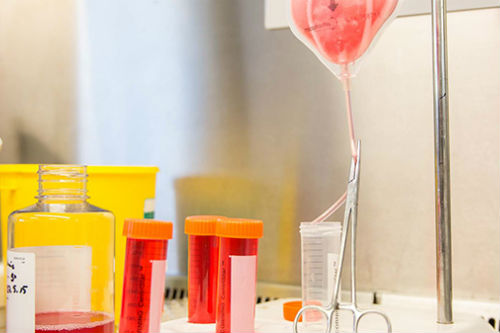 New diagnostic tests for rare kidney disease
Red blood cell research identifies new tests for distal renal tubular acidosis (dRTA) - a potentially fatal kidney disease that can be treated with a spoonful of bicarbonate.
New diagnostic tests for rare kidney disease
Red blood cell research identifies new tests for distal renal tubular acidosis (dRTA) - a potentially fatal kidney disease that can be treated with a spoonful of bicarbonate. -
 Combatting antimicrobial resistance
Microbiologists at the University of Bristol are investigating exactly why current drugs are not working in an attempt to reverse this trend before it’s too late.
Combatting antimicrobial resistance
Microbiologists at the University of Bristol are investigating exactly why current drugs are not working in an attempt to reverse this trend before it’s too late. -
 Improving accuracy of diagnosis for childhood leukaemia
New cell analysis procedures have led to improved diagnostic techniques and national standards for cell processing.
Improving accuracy of diagnosis for childhood leukaemia
New cell analysis procedures have led to improved diagnostic techniques and national standards for cell processing. -
 Helping prevent and treat bowel cancer
Identifying apoptosis (cell suicide) as a plausible scientific mechanism for how a high fibre diet and aspirin may prevent and treat bowel cancer.
Helping prevent and treat bowel cancer
Identifying apoptosis (cell suicide) as a plausible scientific mechanism for how a high fibre diet and aspirin may prevent and treat bowel cancer. -
 Understanding the brain's role in obesity
Using neuroimaging techniques to measure biological responses to food consumption helps researchers work towards finding an effective solution to obesity.
Understanding the brain's role in obesity
Using neuroimaging techniques to measure biological responses to food consumption helps researchers work towards finding an effective solution to obesity. -
 Understanding the building blocks of cancer gives vital clues to treatment
Research into the cellular and molecular basis of cancer has discovered how controlling the protein activity in cells could help treat colorectal cancer.
Understanding the building blocks of cancer gives vital clues to treatment
Research into the cellular and molecular basis of cancer has discovered how controlling the protein activity in cells could help treat colorectal cancer. -
Understanding chronic fatigue syndrome
Using a state-of-the-art MRI scanner helps researchers understand the cognitive impairment which is often associated with chronic fatigue syndrome.
-
 Molecular research improves worldwide feline health
Tests used to detect a range of infectious and genetic diseases in cats have informed diagnosis, treatment and breeding programmes.
Molecular research improves worldwide feline health
Tests used to detect a range of infectious and genetic diseases in cats have informed diagnosis, treatment and breeding programmes. -
 Improving dairy cow welfare and farm profitability
Dairy cows and the dairy farming industry in the UK and overseas are benefiting from strategic animal-husbandry changes and lameness-control programmes.
Improving dairy cow welfare and farm profitability
Dairy cows and the dairy farming industry in the UK and overseas are benefiting from strategic animal-husbandry changes and lameness-control programmes. -
Search for new cancer biomarker propelled by detailed exploration of cell structures
Advances in science, diagnosis and treatment mean that more people than ever before are surviving cancer. But with an increase in survival rates comes an increase in the possibility that for some people, cancer will recur later in life. This presents a continuing challenge for cancer research – biomedical scientists at Bristol University are finding new ways to find a solution.
-
 Landmark discoveries that could dramatically improve cardiac care
Research into the regulation of calcium in cardiac muscle cells uses computer models to further understanding of molecular control and develop new ways to treat heart failure.
Landmark discoveries that could dramatically improve cardiac care
Research into the regulation of calcium in cardiac muscle cells uses computer models to further understanding of molecular control and develop new ways to treat heart failure. -
Neurotransmitters may be behind debilitating headaches
Motivation, addiction, sleep, high blood pressure – one family of neurones is implicated and if researchers at the University of Bristol hypothesise correctly, migraines could also be added to that list.
-
Desensitising toothpastes
Revealing the mechanism behind sensitive tooth pain has helped leading brands develop better desensitising toothpastes that provide relief for pain sufferers.
-
 Reducing heart attack tissue damage
Pharmaceutical companies have shifted their focus for cardioprotective drug development based on research conducted at the University of Bristol.
Reducing heart attack tissue damage
Pharmaceutical companies have shifted their focus for cardioprotective drug development based on research conducted at the University of Bristol. -
 Schizophrenia linked to functional disconnections in the brain
Attempts to understand schizophrenia and its diverse symptoms have taken researchers and psychiatrists on a journey throughout the brain.
Schizophrenia linked to functional disconnections in the brain
Attempts to understand schizophrenia and its diverse symptoms have taken researchers and psychiatrists on a journey throughout the brain. -
 Dental braces and periodontal disease
There's no predisposition for children wearing braces to periodontal disease - as long as they follow the orthodontists’ brushing instructions carefully.
Dental braces and periodontal disease
There's no predisposition for children wearing braces to periodontal disease - as long as they follow the orthodontists’ brushing instructions carefully. -
PReCePT programme helps prevent cases of Cerebral Palsy in preterm birth
Research and application of implementation science drives programme that significantly reduces risk of brain damage in babies born early.
-
Transforming care for patients vulnerable to irreversible kidney failure
Research leads to more targeted and less damaging therapy for nephrotic syndrome.
-
Informing health policy on Covid-19 transmission
In the immediate aftermath of the first Covid-19 lockdown, Bristol researchers helped authorities to better understand the risks of airborne viral transmission and formulate a response.
-
A radical advance in the treatment of age-related macular degeneration
Research leads to increased availability of lower-cost treatment for a major worldwide cause of sight loss.
-
Helping policy makers create an effective vaccination strategy for meningitis B
Research by the University of Bristol supported the UK government’s decision to introduce a new vaccine for UK infants that has led to a 75% reduction in cases.
-
Optimising treatment for prostate cancer
Bristol has contributed to research that provides a new evidence base for improving care and reducing harm caused by treatments.
-
Discoveries lead to better and safer hip and knee replacements
Research profoundly changes the practice of joint replacement globally.
-
A breakthrough in non-invasive breast cancer imaging for early diagnosis
Research by the University of Bristol has helped to develop a world-first radar-based cancer detection system that is now being used in hospitals.
-
Better IVF outcomes
Research improves understanding of effectiveness and risks.
-
The fight to eliminate hepatitis C
Research provides evidence for the effectiveness of treatment and prevention programmes that have influenced international healthcare policies and reduced cases worldwide.
Research groups
Schools and faculties
- Bristol Dental School
- Bristol Medical School
- Bristol Veterinary School
- School of Biochemistry
- School of Cellular and Molecular Medicine
- School of Physiology, Pharmacology and Neuroscience
- School of Psychological Science
- Faculty of Health Sciences
- Faculty of Life Sciences
Externally funded groups
- Avon Longitudinal Study of Parents and Children (ALSPAC)
- Bristol Trials Centre
- CRUK Integrative Cancer Epidemiology Programme (ICEP)
- MRC Integrative Epidemiology Unit (IEU)
- NIHR Collaboration for Leadership in Applied Health Research and Care West (CLAHRC West)
- NIHR Health Protection Research Unit (HPRU) in Evaluation of Interventions
- NIHR School for Primary Care Research
- NIHR School for Public Health Research (SPHR)
- NIHR School for Social Care Research
- NIHR Bristol Biomedical Centre
- The Scar Free Foundation Centre for Children's Burns Research
- Translational Biomedical Research Centre (TBRC)
- UKCRC DECIPHer (Development and Evaluation of Complex Interventions for Public Health Improvement) Centre

